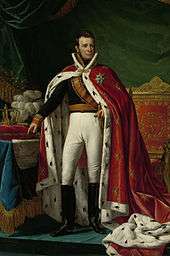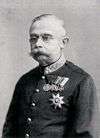Monarchy of Luxembourg
The Grand Duke of Luxembourg is the monarchical head of state of Luxembourg. Luxembourg has been a grand duchy since 15 March 1815, when it was created from territory of the former Duchy of Luxembourg. It was in personal union with the United Kingdom of the Netherlands until 1890 under the House of Orange-Nassau. Luxembourg is the world's only sovereign grand duchy and since 1815, there have been nine monarchs, including the incumbent, Henri.
| Grand Duke of Luxembourg | |
|---|---|
 Coat of Arms of Luxembourg | |
| Incumbent | |
.jpg) | |
| Henri since 7 October 2000 | |
| Details | |
| Style | His Royal Highness |
| Heir apparent | Guillaume, Hereditary Grand Duke of Luxembourg |
| First monarch |
|
| Formation | 15 March 1815 |
| Residence | Grand Ducal Palace in Luxembourg |
Constitutional role
The constitution of Luxembourg defines the grand duke's position:
- The Grand Duke is the head of state, symbol of its unity, and guarantor of national independence. He exercises executive power in accordance with the constitution and the laws of the country.[1]
After a constitutional change (to article 34) in December 2008 resulting from Henri's refusal to assent to a law legalizing euthanasia, laws now no longer require the grand duke's formal assent (implying "approval")[2] but his task of promulgating the law as chief executive remains.
Compensation
The Grand Duke does not receive a salary, but the royal family receives annually 300 000 gold francs (€281 000) for grand ducal functions.[3] In 2017, the Luxembourg budget included €10.1 million for the Grand Duke's household costs.[4]
Succession
Succession to the throne was governed by Salic law, as dictated by the Nassau Family Pact, first adopted on 30 June 1783.[1] The right to reign over Luxembourg was until June 2011 passed by agnatic-cognatic primogeniture within the House of Nassau, as stipulated under the 1815 Final Act of the Congress of Vienna and as confirmed by the 1867 Treaty of London.[1] The Nassau Family Pact itself can be amended by the usual legislative process, having been so on 10 July 1907 to exclude the Count of Merenberg branch of the House, which was descended from a morganatic marriage.[5]
An heir apparent may be granted the style 'Hereditary Grand Duke'. The current heir apparent is Hereditary Grand Duke Guillaume. In June 2011, agnatic primogeniture was dropped in favour of absolute primogeniture, allowing any legitimate female descendants within the House of Nassau to be included in the line of succession.[6]
Full titles
The traditional titulatures of the grand duke are: By the Grace of God, Grand Duke of Luxembourg, Duke of Nassau, Count Palatine of the Rhine, Count of Sayn, Königstein, Katzenelnbogen and Diez, Burgrave of Hammerstein, Lord of Mahlberg, Wiesbaden, Idstein, Merenberg, Limburg and Eppstein. It should, however, be noted that many of the titles are held without regard to the strict rules of Salic inheritance and that most, save for Grand Duke of Luxembourg and Duke of Nassau, are simply not used.
List of grand dukes
House of Orange-Nassau
| Image | Name | Date of birth | Date of death | Reign | Relationship with predecessor |
|---|---|---|---|---|---|
 |
Guillaume I Willem Frederik (Prince William VI of Orange) |
24 August 1772 | 12 December 1843 | 15 March 1815 – 7 October 1840 |
Francis' third cousin and Anne's direct descendant |
 |
Guillaume II Willem Frederik George Lodewijk |
6 December 1792 | 17 March 1849 | 7 October 1840 – 17 March 1849 |
Son of William I |
%2C_koning_der_Nederlanden%2C_Nicolaas_Pieneman%2C_1856_-_Rijksmuseum.jpg) |
Guillaume III Willem Alexander Paul Frederik Lodewijk |
17 February 1817 | 23 November 1890 | 17 March 1849 – 23 November 1890 |
Son of William II |
House of Nassau-Weilburg
Under the 1783 Nassau Family Pact, those territories of the Nassau family in the Holy Roman Empire at the time of the pact (Luxembourg and Nassau) were bound by semi-Salic law, which allowed inheritance by females or through the female line only upon extinction of male members of the dynasty. When William III died leaving only his daughter Wilhelmina as an heir, the crown of the Netherlands, not being bound by the family pact, passed to Wilhelmina. However, the crown of Luxembourg passed to a male of another branch of the House of Nassau: Adolphe, the dispossessed Duke of Nassau and head of the branch of Nassau-Weilburg.
In 1905, Grand Duke Adolphe's younger half-brother, Prince Nikolaus Wilhelm of Nassau, died, having left a son Georg Nikolaus, Count von Merenberg who was, however, the product of a morganatic marriage, and therefore not legally a member of the House of Nassau. In 1907, Adolphe's only son, William IV, Grand Duke of Luxembourg, obtained passage of a law confirming the right of his eldest daughter, Marie-Adélaïde, to succeed to the throne in virtue of the absence of any remaining dynastic males of the House of Nassau, as originally stipulated in the Nassau Family Pact. She became the grand duchy's first reigning female monarch upon her father's death in 1912, and upon her own abdication in 1919, was succeeded by her younger sister Charlotte, who married Felix of Bourbon-Parma, a prince of the former Duchy of Parma. Charlotte's descendants have since reigned as the continued dynasty of Nassau, and also constitute a cadet branch of the House of Bourbon-Parma.
| Name | Portrait | Birth | Marriages | Death | Succession right |
|---|---|---|---|---|---|
| Adolphe 23 November 1890 – 17 November 1905 |
 |
24 July 1817 Wiesbaden (Prussia) |
(1) Grand Duchess Elizabeth 31 January 1844 [1 child (stillborn)] (2) Grand Duchess Adelheid-Marie 23 April 1851 [5 children] |
17 November 1905 (88) Colmar-Berg |
Third cousin of William III |
| Guillaume IV 17 November 1905 – 25 February 1912 |
 |
22 April 1852 Wiesbaden (Prussia) |
Grand Duchess Marie Anne [6 children] |
25 February 1912 (59 years) Colmar-Berg |
Son of Adolphe |
| Marie-Adélaïde 25 February 1912 – 14 January 1919 (abdicated) |
 |
14 June 1894 Colmar-Berg |
Unmarried [childless] |
24 January 1924 (29 years) Lenggries (Germany) |
Daughter of William IV |
| Charlotte 14 January 1919 – 12 November 1964 (abdicated) |
 |
23 January 1896 Colmar-Berg |
Prince Felix 6 November 1919 [6 children] |
9 July 1985 (89 years) Fischbach |
Daughter of William IV / Sister of Marie-Adélaïde |
| Jean 12 November 1964 – 7 October 2000 (abdicated) |
 |
5 January 1921 Colmar-Berg |
Grand Duchess Joséphine Charlotte 9 April 1953 [5 children] |
23 April 2019 (98 years) Luxembourg City |
Son of Charlotte |
| Henri 7 October 2000 – present |
.jpg) |
16 April 1955 Betzdorf |
Grand Duchess Maria Teresa 4/14 February 1981 [5 children] |
Living (65 years) | Son of Jean |

Grand ducal consorts
- Princess Wilhelmine of Prussia (first wife of Grand Duke William I)
- Grand Duchess Anna Pavlovna of Russia (wife of Grand Duke William II)
- Princess Sophie of Württemberg (first wife of Grand Duke William III)
- Princess Emma of Waldeck and Pyrmont (second wife of Grand Duke William III)
- Princess Adelheid-Marie of Anhalt-Dessau (wife of Grand Duke Adolphe)
- Infanta Marie Anne of Portugal (wife of Grand Duke William IV)
- Prince Felix of Bourbon-Parma (husband of Grand Duchess Charlotte)
- Princess Joséphine Charlotte of Belgium (wife of Grand Duke Jean)
- María Teresa Mestre y Batista-Falla (wife of Grand Duke Henri)
See also
- Grand Ducal Family of Luxembourg
References
- "Constitution de Luxembourg" (PDF) (in French). Service central de législation. Archived from the original (PDF) on 9 October 2016. Retrieved 3 April 2016.
- "Luxembourg strips monarch of legislative role". The Guardian. London. 12 December 2008. Retrieved 4 May 2010.
- http://www.monarchie.lu/fr/monarchie/finances/index.html
- "Richest royals: what Europe's royal families get from their taxpayers - Business Insider".
- (in French and German) "Mémorial A, 1907, No. 37" (PDF). Service central de législation. Archived from the original (PDF) on 26 February 2008. Retrieved 14 January 2008.
- "New Ducal succession rights for Grand Duchy". Luxemburger Wort. 21 June 2011. Archived from the original on 19 December 2012. Retrieved 11 July 2011.
External links




